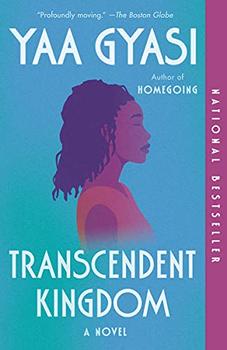Summary | Excerpt | Reading Guide | Reviews | Beyond the book | Read-Alikes | Genres & Themes | Author Bio

Yaa Gyasi's (pronounced "yah jessie") Transcendent Kingdom is, among other things, a meditation on science and religion. However, this cursory description doesn't do justice to the full contents of the novel any more than the scientific method encompasses the human quest for knowledge, or than the practice of prayer explains the human impulse to seek guidance from a higher power.
Gyasi's book follows a woman named Gifty as she cares for her depressed, bedridden mother and attempts to reconcile her present existence as a graduate student studying neuroscience with her past existence as a fervently religious child. A series of flashbacks swirl around the present timeline, covering key events that have produced profound effects on Gifty: her father's decision to return to his home country of Ghana, leaving his family behind in Alabama; her brother Nana's opioid addiction and death; and the subsequent breakdown of her mother's mental health, which now seems to be recurring.
As first-person narrator, Gifty takes the methodical approach one might expect of a scientist to understanding the raw material of her life. The author takes a similar approach to dissecting and arranging events in a logical (if not always chronological) order. A tendency towards systematic, evidence-based thinking is also visible in younger Gifty, whose journal entries, in which she writes to God, read as experiments in defining and communicating with the unknown. That the result of all of this is an emotionally evocative text may appear paradoxical, but this seems to be the point; the main character's strong spiritual experiences and her scientific outlook on life are not in conflict but firmly intertwined.
Gifty is both a fascinating observer and a strangely likable person — strangely because her likability is at odds with the way she treats others. She struggles with expressing herself romantically and sexually, has a habit of ghosting friends and lovers, and keeps details of her brother's death and life from those who seek to be close to her. She has a tendency towards self-deprivation, developed in response to Nana's addiction as well as the rigidity instilled by her evangelical past, which lives on in the beliefs of her still-evangelical mother, who is now barely speaking to her. But from the inside perspective the reader is given, Gifty isn't only sympathetic and comprehensible, she is a warm and funny character with touching quirks and vulnerabilities, one who explains her job on first dates by saying she gets mice hooked on cocaine (when in fact she has switched to feeding them Ensure because it is more easily accessible and the mice find it just as addictive) and avoids a certain Safeway because she is afraid the intimidatingly beautiful cashier who works there will judge her shopping choices.
The work that Gifty is struggling to complete in grad school, which she hopes will lead to better methods of treatment for addiction, is — like her forays into faith — an attempt to understand and gain mastery over the mechanisms of desire and restraint. But it is also an outlet for her genuine curiosity, as well as a way of feeling close to her brother, of whom she eventually reaches an understanding that stretches far beyond the question of his lack of self-control:
Forget for a moment what he looked like on paper, and instead see him as he was in all of his glory, in all of his beauty. It's true that for years before he died, I would look at his face and think, What a pity, what a waste. But the waste was my own, the waste was what I missed out on whenever I looked at him and saw just his addiction.
The flipside of Gifty's wish for control, and her most sympathetic trait, is her willingness to remain open to reevaluation. This is what ultimately allows her to come to terms with her brother's death, her father's estrangement, her mother's state of mind and the loss of her own younger self.
The expected route for the novel to take would be to reveal Gifty's work as a futile attempt to "fix" her world. But Gyasi lets her protagonist's science remain as multitudinous as her self, lets the reader experience the same quiet struggles and occasional sense of wonder that Gifty does. Similarly, her childhood belief in God does not exist for the sake of mere character definition; religion acts with agency upon her life, an entity in itself. This generous approach to concepts that are often reduced to stereotypes or mere facets of identity is striking, and it forms the core of a novel that is humbling in its uncompromising wholeness.
![]() This review was originally published in The BookBrowse Review in September 2020, and has been updated for the
August 2021 edition.
Click here to go to this issue.
This review was originally published in The BookBrowse Review in September 2020, and has been updated for the
August 2021 edition.
Click here to go to this issue.

If you liked Transcendent Kingdom, try these:

by Betsy Lerner
Published 2025
No one will love you more or hurt you more than a sister.
From Betsy Lerner, celebrated author of The Bridge Ladies, comes a wry and riveting debut novel about family, mental illness, and a hard-won path between two sisters.

by Hisham Matar
Published 2025
A luminous novel of friendship, family, and the unthinkable realities of exile, from the Booker Prize–nominated and Pulitzer Prize–winning author of The Return
Your guide toexceptional books
BookBrowse seeks out and recommends the best in contemporary fiction and nonfiction—books that not only engage and entertain but also deepen our understanding of ourselves and the world around us.